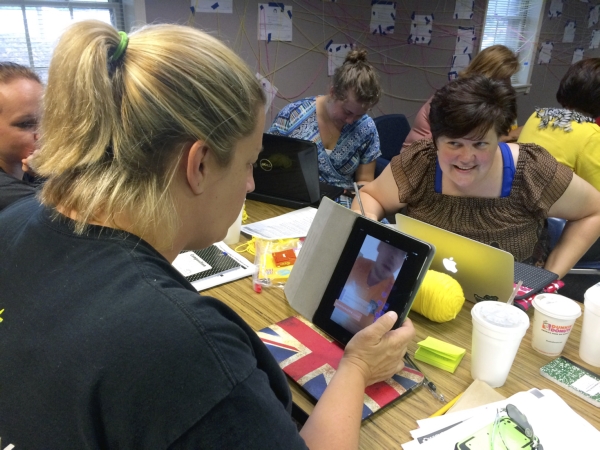Local teachers attend problem-based learning conference
Published 12:00 am Friday, June 19, 2015

- Kara Smith and Amy Snyder listen in as Smith uses a program to watch a man cook live from Scotland. Jeanie Groh/Salisbury Post
The Rowan-Salisbury School System is in the business of change these days, and with that comes a new way of doing things, including teaching.
This week, 63 teachers from nearly every school in the district attended a problem-based learning conference led by Discovery Education’s professional development team.
“We’ve been learning how to integrate PBLs, or problem-based learning, into our everyday teaching,” said Stephanie Kluttz, a first-grade teacher at Granite Quarry Elementary School.
Problem-based learning exposes students to real world situations, she explained.
Problem-based learning, along with digital devices, a focus on literacy, engaging lessons and a data-based approach, are just pieces that make up the district’s new CCRP teaching model. CCRP stands for connected learning, collaboration, relevancy and personalization.
“They’re all interconnected,” said Assistant Superintendent of Curriculum Dr. Julie Morrow. “It’s not a thing. It’s a way of doing.”
Shayla Rexrode, partnership manager for Discovery Education, said the group realizes that this past year has been filled with new tools and hardware. Their goal was to show the teachers how to use those tools and to integrate them into CCRP.
Rowan-Salisbury is “very strategic,” Rexrode said, adding that she’s been planning this conference for six months to a year.
Throughout the conference, teachers learned creative ways to facilitate research, how to connect with experts and how to display what they learned.
“We’ve given them some resources,” Morrow said.
The teachers didn’t just learn about the tools, however. They worked in groups and actually used the tools.
There was a steady buzz throughout the room Wednesday afternoon as the teachers collaborated to try out different methods.
“This is the way our classrooms need to be,” Morrow said.
Hanford-Dole teacher Janelle Etheridge and her table created a video about digital storytelling.
“It’s so easy,” she said. “We all contributed.”
Etheridge talked about how the project required research, hands-on creation and technology.
Teacher Candi Craven pointed out that a video is a “less threatening” way to present information for some students.
Amy Snyder and Kara Smith found a mobile application that allows them to talk to experts all over the world.
“We’re talking to a guy in Scotland,” Snyder said. “He’s making chicken and peppers in Scotland.”
On Thursday, the teachers spent the day planning problem-based learning lessons for their classes.
Not only did the week-long conference give the teachers the tools they needed to be able to lead problem-based learning in their own classrooms, but the facilitators modeled CCRP by the way they led the sessions.
Each night, the leadership team looked for ways to personalize each teacher’s experience. They did that by changing seating plans, reorganizing groups and redefining lesson plans.
“We’re modeling it for them,” Morrow said.


